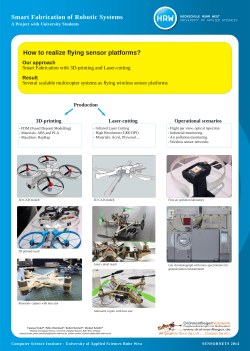
APTEEN: A Hybrid Protocol for Efficient Routing and
APTEEN: A Hybrid Protocol for Efficient Routing and Comprehensive Information Retrieval in Wireless Sensor Networks Arati Manjeshwar, Dharma P. Agrawaly IPDPS’02 Speaker : Chi-Chih Wu Outline Introduction Hybrid Network Protocol : APTEEN Performance Evaluation Conclusions Introduction Advantages of Wireless Sensor Network over wired ones Ease of deployment Fault-tolerance Self-organization Limitations of wireless media Low bandwidth Error prone transmissions Collision free channel access requirements Introduction Limited Energy Longevity of the network Below 40oF , north-east quadrant beyond 200oF , next 2 hours average , north-east quadrant , last 5 hours Which Area , Between 40oF-200oF , past 2 hours Introduction Queries Historical queries One-time query What was the temperature 2 hours back in the northwest quadrant What is the temperature in the northwest quadrant Persistent Report the temperature in the northwest quadrant for the next 2 hours Introduction Wireless sensor network’s protocol Data centric Capable of effective data aggregation Distribute energy dissipation evenly Efficiently use their limited energy to increase the longevity of the network Avoid any single point bottleneck (except BS) Hybrid Network Protocol communication : APTEEN SN -Hybrid Networks Proactive Networks SN BS Sensing SN SN Reactive Networks The nodes periodically switch on their sensors and transmitters (LEACH) The nodes react immediately to sudden changes in the value of a sensed attribute beyond a pre-determined threshold value (TEEN) SN Hybrid Network SN BS Sensing suddenEnergy changes APTEEN (Adaptive Periodic Threshold-sensitive SN Efficient Sensor Network Protocol) SN Hybrid Network Protocol : APTEEN Adequate Power -Sensor Network Model Transmit directly to the sensor node Hierarchical Clustering Homogeneous Limited Energy Hybrid Network Protocol : APTEEN -Sensor Network Model Hierarchical reduce Clustering routing complexity larger distance LEACH-C Decide CH (5%) Evenly distribute Optimally form cluster aggregation most adjacent transmit only to CH Hybrid Network Protocol : APTEEN -Adaptive Periodic Threshold-sensitive Energy Efficient Sensor Network Protocol CH first broadcasts the following parameters Attributes (A) Thresholds Hard threshold (HT) Soft threshold (ST) Schedule TDMA 1.Cluster change time 2.TDMA schedule Count Time and parameters Proactive component Cluster formation TC Frame time (TDMA) Frame time (TDMA) … Hybrid Network Protocol : APTEEN -Adaptive Periodic Threshold-sensitive Energy Efficient Sensor Network Protocol Modified TDMA Schedule BS CDMA Inter-cluster collision Common CDMA code CH CH CH -> BS BS -> N 1.1 1.2 1.3 1.4 1.5 CH->BS 1.1.1 1.1.2 1.1.3 1.1.4 1.1.5 1.1.6 Frame Time BS->N 1.1.7 1.1.8 CH->BS BS->N Performance Evaluation Simulation Environment NS-2 simulator 100 nodes Area of 100 * 100 units Fixed base station The nodes are place randomly 0 – 200 oF Initial energy is 2J Idle power dissipation (10% radio energy) Sensing power dissipation( 10% idle energy) Poisson arrival process of the arrival queries Performance Evaluation Performance Evaluation Performance Evaluation Conclusions The hybrid protocol APTEEN It combines the best features of both proactive and reactive networks Provides periodic data collection as well as near real-time warnings about critical events THANK YOU
© Copyright 2025












